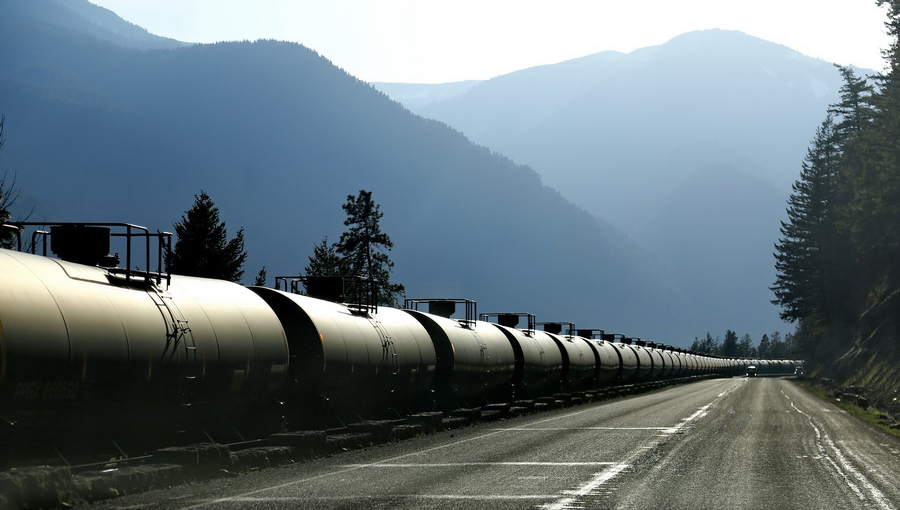Tesoro’s Vancouver Energy Oil Terminal
Tesoro Savage's proposal, located on the Columbia River waterfront in Vancouver, WA, would be the largest oil terminal in the country

Sited at the Port of Vancouver on the Columbia River, the joint venture of Tesoro and Savage would receive 360,000 barrels of explosive Bakken oil per day from trains traveling through the Columbia River Gorge. (Photo: Bergman Photographic Services)
Project Status Updates:
July 2017
A hearing on Tesoro’s air quality permit was held on June 7, marking the end of a one-month comment period on that permit process. Once more, hundreds of people turned out to testify against the terminal, and thousands more submitted comments online. The Washington state Energy Facility Site Evaluation Council, or EFSEC, filed an extension that will give it until Aug. 31 to make a recommendation to Washington Gov. Jay Inslee. After that, the governor will have 60 days to make a final decision about whether to permit the facility.May 2016
The Draft Environmental Impact Statement (DEIS) public review period ended in late January. A record 289,000-plus comments were submitted to the Washington Energy Facility Site Evaluation Council (EFSEC), with the overwhelming majority opposing the project. Approximately 2,000 people attended three public hearings (two in Clark County, WA, one in Spokane), also with a large majority in opposition. The next step in the process will entail a review of the DEIS by the council which is expected to last anywhere from months to over a year. They will then issue a final EIS along with a recommendation to the Washington Governor to either approve or deny the project.
Project Background
Tesoro Savage's proposal for the Columbia River waterfront in Vancouver, WA represents the most prominent of the numerous Northwest crude oil transport terminal plans. It would be the largest oil terminal in the country, and by far the largest in the Northwest. If approved by Governor Jay Inslee, the so-called Vancouver Energy terminal would receive 360,000 barrels of oil per day carried on BNSF Railway Company tracks. This translates to five additional oil trains, each a mile-and-a-half long and carrying upwards of a million gallons of Bakken crude, rolling through the Columbia Gorge every day.
In July 2013, Tesoro, which has a history of manipulating Washington state politics, won approval from commissioners at the Port of Vancouver for a lease agreement to operate a facility to handle this unprecedented amount of oil, pending approval from state regulators.
Tesoro has a documented record of violating pollution laws, disregarding workers' safety, oil spills, and secrecy. Citizens and businesses in Vancouver, as well as concerned citizens along the rail shipping route, mounted opposition to the terminal. In response to these environmental, public safety, and quality of life concerns, the Vancouver city council adopted a resolution in June 2014 opposing the massive terminal. Over 20 other cities and counties have also voted to oppose oil or fossil-fuel traffic through their areas, including the City of Portland, Multnomah County, and the City of Hood River.

An oil train travels westbound between the Columbia River and Washington State Route 14. (photographer: Micheal Drewry)
Regulatory Process and Public Opposition
The Washington Energy Facility Siting and Evaluation Council (EFSEC), is responsible for reviewing applications for oil terminals involving storage of 50,000 barrels of oil or more. EFSEC then recommends that Washington's Governor either approve or deny the project. The Governor has final decision-making authority. Appeals of the decision can be fast-tracked to review by the Washington state Supreme Court.The EFSEC required preparation of an environmental impact statement for Tesoro Savage's proposed terminal. In March 2014, after receiving a record number of public comments, EFSEC determined the scope of its environmental review would include robust analyses of alternatives, transportation impacts of shipping coal throughout the state, out-of-state transportation impacts, community safety, air and water quality, cumulative effects of the proposal along with other likely projects in Oregon and Washington, and greenhouse gas emissions from the burning of refined fossil fuels.
EFSEC’s Draft Environmental Impact Statement (DEIS), issued in November 2015, stated that if built, the terminal could result in a derailment every two years and an oil spill from a derailment once every 12 years. The DEIS also indicated that most fire departments along the oil trains’ rail route are not prepared for a spill or fire that could accompany a derailment. Only one department reported that its firefighters are trained and equipped for such an incident.
This analysis is actually overly optimistic: A month after the DEIS was released, it was reported that three of the four authors hired to write the analysis are former executives of BNSF Railway, and that the DEIS “vastly understated” the worst-case scenario for a catastrophic oil spill.
The 60-day public comment period on the DEIS for Tesoro Savage’s terminal resulted in a record-shattering 290,000 comments, almost all of which stated opposition to the project. Over 2,000 people showed up to 3 hearings on the DEIS that month.
Resources
Stand Up to Oil coalition, of which Friends is a memberSightline Institute articles about crude oil transport
